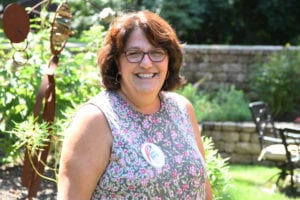
Karen Berg will become the only known Jew in the Kentucky Legislature, and one of only two physicians, if she wins election to the the Senate from the 26th District in November. (Community photo by William Beasley)
Karen Berg always saw herself going into politics. In fact, she had it all figured out.
“I was actually a political science major,” she said. “I was going to go to law school, I was going to work for Legal Aid. I was going to run for office, maybe be a judge, and hopefully change the world.”
A three-month summer internship at Legal Aid changed all that.
“At the end of that summer, the lawyers that I worked with had a little goodbye party for me,” Berg recalled. “They sat me down after the party and said, ‘Karen, you can do anything; don’t do this.’ And they meant it. They were miserable. They had no funding; they had no support; they had piles and piles of cases on their desks that they didn’t feel they were adequately equipped to address.”
So the Louisville native and daughter of the late Dr. Harold and Pearl Berg abruptly shifted gears. She completed all her pre-med prerequisites in one year, went to medical school and became a radiologist.
She happily practiced medicine for 31 years (and continues to work part-time). Still, she remained drawn to politics, and concerned by the direction that Kentucky and the country were taking.
So last year, the same day she retired from University Hospital, Berg went to Jefferson County Democratic Headquarters, and announced to its executive committee that she was running for the Kentucky Senate from the 26th District.
“I had talked to my family a long time before I did this,” Berg said. I said, ‘Guys, this is what I’m thinking about doing. Are you OK with it?’”
She also joined Emerge America, a national program that trains Democratic women to run for office and win. Women must apply months ahead of the six-month program.
“It’s not like people didn’t have plenty of warning,” she said. “They knew this is what I was getting ready to do.”
Today, Berg, 56, a self-described fiscal conservative and social liberal, is running a spirited, grassroots campaign against her Republican opponent, incumbent Ernie Harris, who has been in the Senate since 1995. She has knocked on nearly 11,000 doors in Jefferson and Oldham counties and shown up at public rallies – including the June 30 downtown demonstration for children separated from their parents at the border – all with the backing of a staff of family, friends and volunteers.

Karen Berg, seen here with Community Editor Lee Chottiner, has lived in the Kentucky 26th Senatorial District most of her life, and she resides in the same house where she grew up, her father’s mosaic murals and husband’s paintings adorning the walls. (Community photo by William Beasley)
If she wins, Berg, it is believed, will be the only Jew in the Kentucky Legislature – an assembly not known for its ethnic and religious diversity. Its last known Jewish lawmaker, Kathy Stein, D-Lexington, served in the House from 1997 to 2008, and the Senate from 2009 to 2013 before leaving to become a Fayette County Family Court judge.
Sitting in her house, sporting a big campaign button on her dress, surrounded by walls adorned with her father’s mosaics and her husband’s oil paintings, her dog Yofie barking on the couch, Berg offered several reasons why she thinks she has a shot at winning.
The changing demographics in her district favor a Democrat, she said. The district is one of the most affluent, best educated in the state, and she’s betting her positions will resonate with those voters.
She has lived in the district most her life. In fact, she and her husband, Bob Brousseau, reside in the same house where she grew up.
More than 10,500 voters turned out for the recent Democratic primary, in which Berg garnered 7,112 votes. Compare that with the Republican primary, when less than 10,000 voters came to the polls, giving Harris a slim majority – 5,193 – compared to his opponent’s 4,750 votes, and Berg thinks she’s generating more interest among constituents.
“A lot of Ernie’s long-term constituents didn’t vote for him – almost half,” she said.
Finally, this is a campaign season where women are running, and winning, in eye-opening numbers, as well as casting ballots. She believes her issues dovetail with those of other women.
Berg favors keeping public money in public schools, opposing both charter schools and a state takeover of JCPS; she calls for development that improves highways while protecting open spaces; she favors common sense gun control, Medicaid expansion and single-payer healthcare, alternative energy, and a plan to fund state pension plans using gaming revenue and medical marijuana sales.
But she’s betting that her pro-choice stance on abortion will especially galvanize women voters.
“For the most part, women my age and older remember what it was like before Roe v Wade,” she said. “They remember that women died – died horrible septic deaths. They don’t want to go back there. They may not agree with abortion, but they don’t want women to die as a result of that choice.”
This election, Berg is marveling at how her gender is proving to be a political plus.
“The fact that I’m a woman makes a huge difference,” she said. “For the first time in my life, I feel like maybe being a woman is actually an advantage rather than a disadvantage.”
But what about being Jewish?
“That’s a really good question,” Berg replied. “I don’t know how many voters know I’m Jewish. I certainly don’t hide the fact, and I certainly am unequivocally 100 percent Jewish, but how much of an impact it has on the day-to-day voters, I don’t know.”
She stopped short of saying her opinions reflect Jewish values.
“I think they reflect my values,” she said. “Are they Jewish values or humanitarian values? I don’t know. I know that there are certain basic things I was taught to believe in. One is that you have a responsibility, not just to you and your family, but you have a responsibility to your neighbor.”
Berg’s parents were both first-generation Americans who moved to Louisville from New York. Harold Berg went to medical school here and became a physician and well-known mosaic artist. His murals hang all over town, including the CenterStage auditorium. Berg still has a basement closet chock full of his tiles.
Pearl Berg, a nurse, English teacher and lawyer, “loved education,” her daughter said.
Both parents were active in Jewish organizations “In every way, shape or form,” Berg said. “There wasn’t a Jewish organization my parents somehow didn’t support. It was just who they were.”
Jews who have run for office before Berg dismiss the idea that her religion could color the outcome of her campaign.
Amy Shir, who ran unsuccessfully for the state House in 2006, doesn’t think being Jewish affected her campaign, or that it will affect Berg’s.
“Being a Democrat affected the outcome,” she said of her campaign. “I had a few people ask me whether I took Jesus Christ as my personal lord and savior, but it was my party affiliation that mattered.”
She added that it could be more of a factor in a statewide race.
Likewise, Louisville Metro Councilman Brandon Coan (D-8) and Jerry Abramson, long-time mayor of Louisville and former Lieutenant Governor of Kentucky, don’t believe religion will be a factor.
“In my judgment, it does not,” said Abramson, who lives in Berg’s district and is endorsing her. “It did not for me in my lieutenant governor’s race. It did not for me in my five mayoral races. I think people will be much more interested in her on the issues.”
U.S. Rep. John Yarmuth, who also has endorsed Berg, agreed.
“Jerry Abramson and I, and many other Jewish candidates, have been elected in this community over the years,” Yarmuth said in a prepared statement. “I am not concerned that Karen’s religion will prevent her from winning her race. She’ll be a fantastic state senator for the people of District 26.”
In the final weeks of the campaign, Berg said she will concentrate on getting her voters to the polls, which she believes will make the difference in this race.
“When I was a political science major, I actually did my thesis on why people didn’t vote,” she said. “My argument was that people didn’t really see a difference between the candidates; it didn’t really matter who won, because society was relatively homogenous and the difference between this person and that person wasn’t really going to make that much of an impact on anybody’s life.”
Not anymore.
“We now know that every vote matters – every vote matters,” she added, “and who you vote for matters. It matters a lot.”




What is the date of this special election?
Why is there a special election at this time?
I have been asked to donate to Dr. Berg. I am happy to do so, but I would like to know more.
Thank you,
Patrisha Thomson